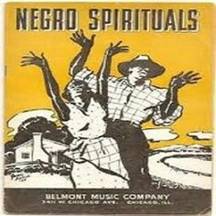Spirituals (or Negro spirituals) are generally Christian songs that were created by African slaves in the United States. Spirituals were originally an oral tradition that imparted Christian values while also describing the hardships of slavery. Although spirituals were originally unaccompanied monophonic (unison) songs, they are best known today in harmonized choral arrangements. This historic group of uniquely American songs is now recognized as a distinct genre of music. (More from Wikipedia)
Most early songwriting though was not written down, but was passed along orally. Much was likely sacred in nature: The Psalms in the Bible for instance were actually meant to be sung, not spoken; and over a third of the 150 psalms have some musical direction in the text.
More recently, “Negro spirituals” are a type of work song that was sung among African American slaves; today, they are recognized as a separate genre of music. The first major compendium of Negro spirituals, Slave Songs of the United States was published in 1867. Some have become quite famous, and even the likely authorship is known in some cases. Wikipedia reports that “Swing Low, Sweet Chariot” was written by Wallis Willis sometime before 1862.
* * *
Quoting from a Negro spiritual called “Free at Last”, the rousing 1963 “I Have a Dream” speech by Rev. Dr. Martin Luther King, Jr. ends: “When we let freedom ring, when we let it ring from every village and every hamlet, from every state and every city, we will be able to speed up that day when all of God’s children, black men and white men, Jews and Gentiles, Protestants and Catholics, will be able to join hands and sing in the words of the old Negro spiritual, ‘Free at last! free at last! thank God Almighty, we are free at last!’”
* * *
Since Richie Havens was about the only musician who had arrived at the 1969 Woodstock festival before the highways became hopelessly jammed, he played for hours. As he recalls (quoting from Wikipedia): “I’d already played every song I knew and I was stalling, asking for more guitar and mic, trying to think of something else to play – and then it just came to me . . . The establishment was foolish enough to give us all this freedom, and we used it in every way we could.”
After a remarkably quick guitar tuning, Richie Havens then improvised a song called “Freedom” that was based on the Negro spiritual “Sometimes I Feel Like a Motherless Child”. It was this performance that made it into the Woodstock movie. Bob Dylan has incorporated “Motherless Child” into his songs; Wikipedia lists dozens of others who have also recorded the song in one form or another.
Other famous Negro spirituals include “Go Down Moses”, “Nobody Knows the Trouble I’ve Seen”, and “Were You There (When They Crucified My Lord)”. Some modern songs have the distinct feel of Negro spirituals, such as Andraé Crouch’s “Soon and Very Soon” and James Cleveland’s “I Don’t Feel No-Ways Tired”.
(March 2015)















